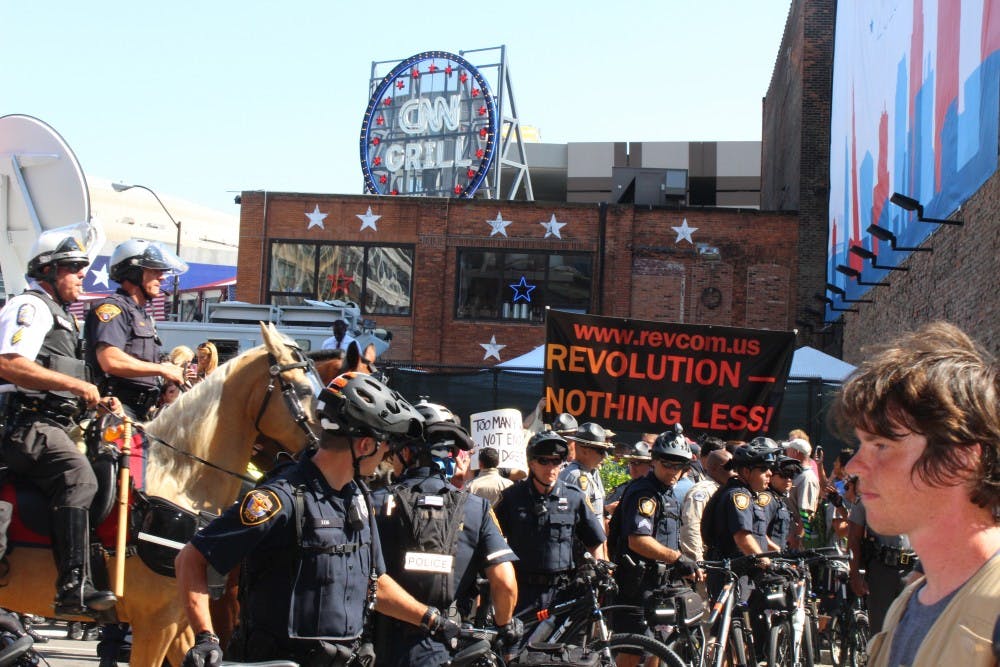CLEVELAND — The Cleveland Police Department would hope for the best and expect the worst.
Administrative and Presiding Judge Ronald Adrine said preparations for the Republican National Convention were “based upon worst-case scenario,” yet there have been fewer arrests than expected.
Until Wednesday, only three arrests had been made in relation to RNC demonstrations, according to Adrine. However, a flag burning protest took place on Fourth and Prospect streets on Wednesday afternoon, which ended with around a dozen arrests and two officers sustaining minor injuries.
Police officers formed barriers against crowds of onlookers and journalists struggling to capture what became one of the most chaotic and controversial demonstrations so far this week.
An hour before the demonstration took place an anti-gay religious group entered the area and began condemning the act of burning an American flag.
A man with a megaphone preached to the crowds and claimed flag-burners do not belong in America and will “burn in hell” for their actions.
Eventually, the anti-gay religious extremist group took its sermons elsewhere. Police also broke their long barrier of bikes around the intersection after it appeared no demonstrations would take place.
Almost immediately after police cleared the scene a group of protesters quickly changed into T-shirts with “Revolutionary Communist Party” name written on them and began to set fire to an American flag.
“America was never great,” they chanted.
The group “has taken on the responsibility to lead revolution in the U.S., the belly of the imperialist beast, as its principal share of the world revolution and the ultimate aim of communism,” according to its website.
Local news stations reported several people were seen wrestling with police and at least six were taken away in handcuffs. The Cleveland Police Department tweeted about the confrontation, saying firefighters extinguished the fire and “took the flag that protesters attempted to destroy.”
Remnants of red and white striped fabric left withered in the street.
Multiple police officers riding horses pushed through the thick crowds of people swarming the area, ordering media workers to quickly disperse.
Crowds still lingered long after the demonstration ceased.
In preparation for potential mass arrests, the Cleveland Municipal Court greatly extended its hours and expanded the number of beds available for detainees.
Though the court normally operates from 8:30 a.m. to 4:30 p.m., those hours have extended from 5 a.m. to 1 a.m. during the convention.
The court anticipated an estimated 1,000 arrestees per day. Adrine said the Cleveland Municipal Court looked back at previous convention cycle arrests to determine how many arrestees the court could process this.
“In order to do that, we suspended or postponed all the regular hearings that would have been scheduled for this week and replaced them for potential dockets,” he said.
The recent political climate in the country also influenced intense security preparation for the convention. Police were the targets of attacks in Baton Rouge, Louisiana, and Dallas as retaliation after two black men who were killed by police in separate incidents in recent weeks.
“It’s been clear for a long time that the mood in the country is ugly and that there are a lot of people who are angry at the political system and angry at the establishment,” Adrine said.
He said their biggest fear was groups would come to Cleveland and clash with one another.
However, he said the CPD has been preparing for “every potential trouble spot” and is aiming to eliminate any hypothetical hot spots before they present themselves.
Increased police presence has also helped hinder people who might attempt to cause trouble during demonstrations, he said.
“It has had a deterrent effect on people who might have been acting out just to act out,” Adrine said.






